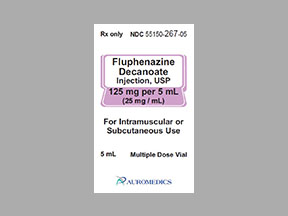
Fluphenazine Decanoate Coupons & Savings Card – Discount Prices from $47.04
My prescription
Edit
5ML of 25MG/ML, Fluphenazine Decanoate (1 Vial)
Select pharmacy

CVS
$62.02
COUPON PRICE
Walgreens
$47.04
COUPON PRICE
Albertsons
$66.45
COUPON PRICE
Walmart
$77.72
COUPON PRICEFluphenazine Decanoate savings card
Show this card to your pharmacist
Walgreens
$47.04
BIN
ID
PCN
GRP
011867
LH2AC010A1
HT
LABH001
Powered by
More prescriptions for schizophrenia
More prescriptions for schizophrenia
Fluphenazine Decanoate dosage forms
Dosage Quantity Price from Per unit 5ML of 25MG/ML 1 Vial $61.70 $61.70 5ML of 25MG/ML 2 Vials $105.73 $52.87 5ML of 25MG/ML 3 Vials $157.45 $52.48
| Dosage | Quantity | Price from | Per unit |
|---|---|---|---|
| 5ML of 25MG/ML | 1 Vial | $61.70 | $61.70 |
| 5ML of 25MG/ML | 2 Vials | $105.73 | $52.87 |
| 5ML of 25MG/ML | 3 Vials | $157.45 | $52.48 |
Fluphenazine Decanoate Warnings
This medication carries significant safety warnings that should be carefully considered. It is crucial to discuss any concerns with your healthcare provider before use.
- Increased Risk for Older Adults with Dementia: There is a slightly elevated risk of severe, potentially fatal side effects, such as heart failure, irregular heartbeat, and pneumonia, in older adults with dementia. This medication is not approved for managing dementia-related behavior problems. Discuss the risks and benefits, as well as alternative treatments, with your doctor, especially if you or a loved one is over 65 with dementia-related psychosis.
- Movement Disorders: Fluphenazine can cause tardive dyskinesia (TD), a condition characterized by uncontrollable facial movements. This risk is higher in older adults and particularly in women over 65, especially with prolonged use or high doses. Report any such symptoms to your healthcare provider immediately.
- Neuroleptic Malignant Syndrome (NMS): A rare but serious condition, NMS can occur with symptoms like high fever, rapid heart rate, muscle stiffness, and confusion. Seek urgent medical attention if these symptoms develop.
- Low White Blood Cell Counts: This medication may reduce white blood cell levels, increasing infection risk. Notify your healthcare provider if you experience frequent illness or fever, especially if you have a history of low white blood cell counts.
- Elevated Prolactin Levels: Fluphenazine might increase prolactin hormone levels, potentially causing symptoms like nipple discharge, enlarged breasts, sexual dysfunction, menstrual irregularities, and bone weakness. Regular blood tests may be recommended by your provider to monitor prolactin levels.
- Pregnancy Caution: Use fluphenazine during pregnancy only if the potential benefits justify the risks to the unborn baby. There is a higher risk of side effects for newborns exposed during the third trimester. Inform your healthcare provider if you are pregnant or plan to become pregnant.
Contraindications: This medication should not be used under certain conditions due to serious health risks. Consult your healthcare provider if any of the following apply:
- Brain damage or suspected brain damage.
- Use of large doses of hypnotics.
- Coma.
- Severe depression.
- Severe blood or liver problems.
It is crucial to adhere to these warnings and consult your healthcare provider for personalized advice and alternatives.
Fluphenazine Decanoate Side Effects
Common side effects:
- drowsiness
- dizziness
- lightheadedness
- nausea
- loss of appetite
- dry mouth
- blurred vision
- headache
- constipation
- increased sweating
- redness or pain at the injection site
Less common but important to monitor:
- muscle spasms
- involuntary movements
- changes in blood pressure
- weight changes
- fluid retention
- frequent urination
- drooling
- restlessness
- blurry vision
- stuffy nose
- fast heartbeat
- rash or itching
Serious side effects:
- neuroleptic malignant syndrome
- serious blood or liver problems
- allergic reactions causing difficulty breathing or swelling
- unusual mental changes
- seizures
- vision problems
- joint pain
- signs of infection like persistent fever or sore throat
- unwanted breast milk or menstrual changes in females
- sexual dysfunction in males
- prolonged erection
- tardive dyskinesia
Fluphenazine Decanoate Interactions
Interactions with high risk of serious adverse effects and should be avoided:
- guanadrel
- guanethidine
- Lithium
Interactions with moderate risk that may require dose adjustment, closer monitoring, or timing changes:
- opioid pain relievers (such as codeine, hydrocodone)
- alcohol
- marijuana (cannabis)
- sleep or anxiety medications (such as Alprazolam, Lorazepam, Zolpidem)
- muscle relaxants (such as Carisoprodol, Cyclobenzaprine)
- antihistamines (such as Cetirizine, diphenhydramine)
